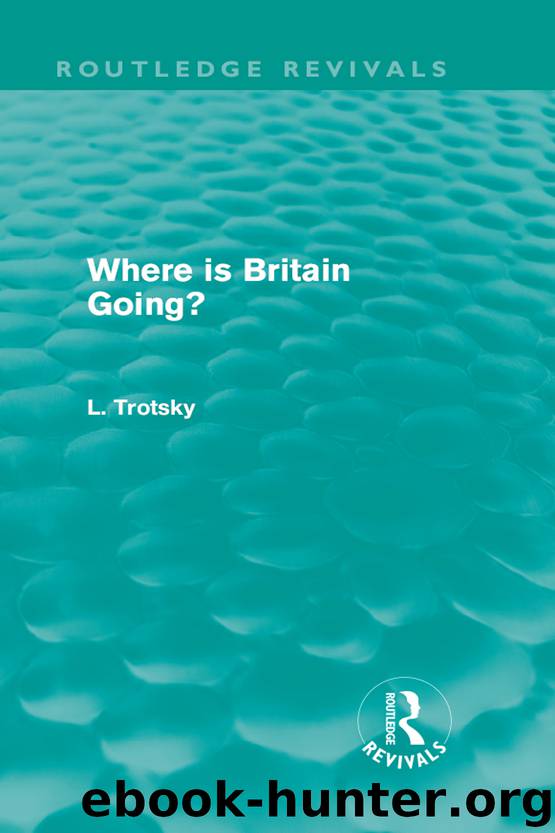Where Is Britain Going? (Routledge Revivals) by Trotsky Leon

Author:Trotsky, Leon
Language: eng
Format: epub
Publisher: Taylor & Francis (CAM)
I Lafargue, Works.
I Lafargue, Works.
VI
TWO TRADITIONS : THE SEVENTEENTH-CENTURY REVOLUTION AND CHARTISM
THE editor of the Daily Herald recently expressed his doubts whether Oliver Cromwell could be called a “pioneer of the labour movement.” One of the staff of the paper, supporting the doubts of the editor, appealed to the harsh justice meted out by Cromwell to the Levellers, an equalitarian (Communist) sect of that day. These reflections and inquiries are extremely characteristic of the historical thought processes of the Labour Party leaders. One would have thought it was not necessary to waste two words on proving that Oliver Cromwell was a pioneer of the bourgeois and not of a socialist society. This great revolutionary bourgeois was opposed to universal suffrage, since he saw in it a danger to private ownership. Hence, it is to the point to mention, the Webbs draw conclusions on the “incompatibility” of democracy with capitalism, closing their eyes to the fact that capitalism has learnt with complete success to live in harmony with democracy, and rules the instrument of universal suffrage just as it rules the instrument of the Stock Exchange.1 None the less, the British workers can learn immeasurably more from Cromwell than from MacDonald, Snowden, Webb, and other compromising brethren. Cromwell was a great revolutionary of his time, and knew, not shrinking from anything, how to maintain the interests of the new bourgeois social structure against the old aristocratic structure. This it is necessary to learn, and in this sense the dead lion of the seventeenth century is immeasurably greater than many living dogs.
Following at the tails of those living non-lions who write leading articles in the Manchester Guardian and other Liberal organs, the leaders of the Labour Party customarily contrast democracy with any kind of despotic government, in the form of the” dictatorship of Lenin ”or of the“ dictatorship of Mussolini.” The historical idiom of these gentlemen is expressed by nothing more clearly than by this comparison. Not because we were disposed to deny the“ dictatorship of Lenin ”in past days—in actual influence on the whole course of affairs in a huge State his rule was unique. But can one speak of a dictatorship, ignoring its social and historical content ? History has known the dictatorship of Cromwell, the dictatorship of Robespierre, the dictatorship of Arakcheeff, the dictatorship of Napoleon I, the dictatorship of Mussolini. There is no point in discussing anything with a blockhead who places Robespierre and Arak-cheeff on the same level. Various classes under various conditions and for various purposes in certain periods, which are the severest and most responsible periods of their history, find themselves compelled to appropriate exceptional force and authority to those of their leaders who most clearly and fully for the given period carry out their fundamental interests. When there is talk of dictatorship it is necessary first of all to explain what interests of just what classes find their historic expression through this dictatorship. Oliver Cromwell for one epoch, Robespierre for another, expressed historically progressive tendencies of development of the bourgeois society.
Download
This site does not store any files on its server. We only index and link to content provided by other sites. Please contact the content providers to delete copyright contents if any and email us, we'll remove relevant links or contents immediately.
International Integration of the Brazilian Economy by Elias C. Grivoyannis(106938)
The Radium Girls by Kate Moore(12003)
Turbulence by E. J. Noyes(8009)
Nudge - Improving Decisions about Health, Wealth, and Happiness by Thaler Sunstein(7682)
The Black Swan by Nassim Nicholas Taleb(7091)
Rich Dad Poor Dad by Robert T. Kiyosaki(6580)
Pioneering Portfolio Management by David F. Swensen(6275)
Man-made Catastrophes and Risk Information Concealment by Dmitry Chernov & Didier Sornette(5982)
Zero to One by Peter Thiel(5770)
Secrecy World by Jake Bernstein(4729)
Millionaire: The Philanderer, Gambler, and Duelist Who Invented Modern Finance by Janet Gleeson(4449)
The Age of Surveillance Capitalism by Shoshana Zuboff(4270)
Skin in the Game by Nassim Nicholas Taleb(4225)
The Money Culture by Michael Lewis(4175)
Bullshit Jobs by David Graeber(4167)
Skin in the Game: Hidden Asymmetries in Daily Life by Nassim Nicholas Taleb(3980)
The Dhandho Investor by Mohnish Pabrai(3745)
The Wisdom of Finance by Mihir Desai(3721)
Blockchain Basics by Daniel Drescher(3568)
